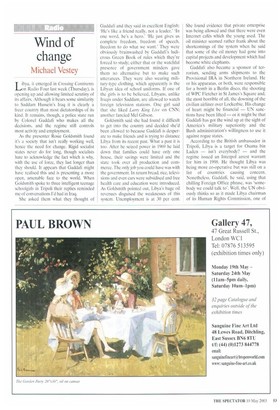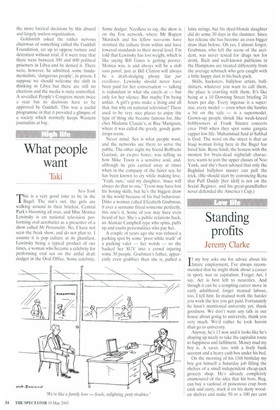Wind of change
Michael Vestey
Tibya, it emerged in Crossing Continents i on Radio Four last week (Thursday), is opening up and allowing limited scrutiny of its affairs. Although it bears some similarity to Saddam Hussein's Iraq it is clearly a freer country than most dictatorships of its kind. It remains, though, a police state run by Colonel Gaddafi who makes all the decisions, and the regime still controls most activity and employment.
As the presenter Rosie Goldsmith found it's a society that isn't really working well, hence the need for change. Rigid socialist states never do for long, though socialists hate to acknowledge the fact which is why, with the use of force, they last longer than they should. It appears that Gaddafi might have realised this and is presenting a more open, amenable face to the world. When Goldsmith spoke to three intelligent teenage schoolgirls in Tripoli their replies reminded me of conversations I'd had in Iraq.
She asked them what they thought of
Gaddafi and they said in excellent English: 'He's like a friend really, not a leader.' In one word, he's a hero.' He just gives us complete freedom, freedom of speech, freedom to do what we want.' They were obviously brainwashed by Gaddafi's ludicrous Green Book of rules which they're forced to study; either that or the watchful presence of government minders gave them no alternative but to make such utterances. They were also wearing military-type clothing, which apparently is the Libyan idea of school uniforms. If one of the girls is to be believed, Libyans, unlike Iraqis under Saddam, are allowed to watch foreign television stations. One girl said that she liked Larry King Live on CNN; another fancied Mel Gibson.
Goldsmith said she had found it difficult to get into the country and decided she'd been allowed to because Gaddafi is desperate to make friends and is trying to distance Libya from its recent past. What a past it is too. After he seized power in 1969 he laid down that families could have only one house, their sayings were limited and the state took over all production and commerce. The only job you could have was with the government. In return bread, rice, televisions and even cars were subsidised and free health care and education were introduced. As Goldsmith pointed out, Libya's huge oil revenues disguised the weaknesses of this system. Unemployment is at 30 per cent. She found evidence that private enterprise was being allowed and that there were even Internet cafés which the young used. The oil minister seemed rather frank about the shortcomings of the system when he said that some of the oil money had gone into capital projects and development which had become white elephants.
Gaddafi also became a sponsor of terrorism, sending arms shipments to the Provisional IRA in Northern Ireland. He or his apparatus, or both, were responsible for a bomb in a Berlin disco, the shooting of WPC Fletcher in St James's Square and, the most horrible of all, the downing of the civilian airliner over Lockerbie. His change of heart might be financial — UN sanctions have been lifted — or it might be that Gaddafi has got the wind up at the sight of America's military superiority and the Bush administration's willingness to use it against rogue states.
According to the British ambassador in Tripoli, Libya is a target for Osama bin Laden — isn't everybody? — and the regime issued an Interpol arrest warrant for him in 1998. He thought Libya was being more co-operative but was still on a list of countries causing concern. Nonetheless, Gaddafi, he said, using that chilling Foreign Office phrase, was 'somebody we could talk to'. Well, the UN obviously thinks so as it made Libya chairman of its Human Rights Commission, one of the more farcical decisions by this absurd and largely useless organisation.
Goldsmith asked the rather nervous chairman of something called the Gaddafi Foundation, set up to oppose torture and detention without trial, if it were true that there were between 300 and 600 political prisoners in Libya and he denied it. There were, however, he admitted, some fundamentalists, 'dangerous people', in prison. suppose we should welcome the shift in thinking in Libya but there are still no elections and the media is state controlled. A so-called People's Congress meets twice a year but its decisions have to be approved by Gaddafi. This was a useful programme in that it provided a glimpse of a society which normally keeps Western journalists at bay.



































































 Previous page
Previous page